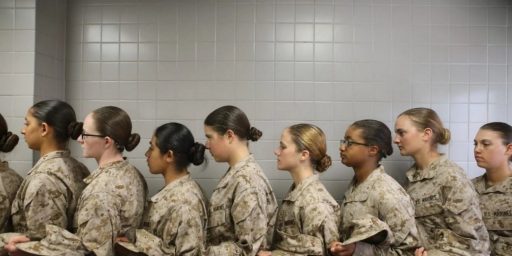Three Year Rule?
StrategyPage — Dealing With the “Three Year Rule”
U.S. military recruiters are nervously waiting for the “Three Year Rule” to kick in. Impatient Americans have never tolerated a war that lasted more than three years. Meanwhile, the mass media has been trying to generate some heat with a “U.S. recruiting falling short during wartime†story angle. It hasn’t been working, mainly because the military has been meeting its recruiting goals. The air force and navy are even laying off people, and all the services are raising their recruit standards.
The mass media also tends to take seriously proposals to revive the draft. What the media have missed is what most military historians know; the draft is a recent (19th century) innovation that never really worked. Britain dropped conscription in the early 1960s. The United States followed a decade later, and by the end of the 20th century, most nations that had conscription were planning to get rid of it. Conscription was never a popular policy for the simple reason that if you take all the young men that are eligible, you go bankrupt training them well, or, as it more often the case, sort of half train them. That means a lot more of them get killed if called up in wartime and sent straight off to combat. If you don̢۪t call everyone into service, you create a lot of discontent among those called (and their families), who note the many others who are not called. If the Vietnam war had not happened, the students (and non-students of the same age) would still have been out their protesting anyway. Not about the war, but about the seemingly arbitrary way a few were drafted, and the majority were let go. During the 1960s, with the baby boomer generation coming of age, there were 3-4 times as many young men available for the draft each year, as were needed.
But why are all those young men, and women, still volunteering when there̢۪s obviously a war going on, and they stand a chance of getting hurt? There are several reasons. But perhaps the most important one is that better training, tactics and equipment have made the current war much less lethal than past wars. The potential recruits realize this. Far more young people come back from the war, with exciting war stories, than come back dead or mutilated. The casualty rates in Afghanistan and Iraq have been lower than any war in the past. This makes a difference, because the young men who volunteer have, like all young men before them, a somewhat reckless attitude. They want some adventure, they want to prove themselves. And they̢۪ve seen guys their age doing and not dying in large numbers. There̢۪s also the patriotic angle. To these young folks, there̢۪s a war on and they have a chance to play a part.
The recruiters report that they are getting more resistance from parents, but once the kids turn 18, they don̢۪t need parental permission. Kids that age, being what they are, will see rebelling against their parents wishes as a positive thing.
What worries the army more is the “three year rule.†Historically, the American public will support a war for three years. If it isn’t over by then, the public mood starts to turn ugly. It’s happened in every American war that went over three years. The war on terror will be three years old in September, 2004. Recruiters are unsure what effect this will have on getting people to volunteer. While most of America’s wars have been fought with volunteers, the two big ones that went the limit without conscription (the American Revolution and the Civil War), ran into manpower problems after the three year limit was hit. But both of those wars had lots more casualties, and defeats, than the war on terror. And even World War II, as popular as it was, saw a growing amount of popular discontent by early 1945. What will happen this time around will be known by 2005, and the recruiters are not looking forward to it.
This is an interesting thesis, although I’m rather skeptical. While I’m sure there was discontent during the latter stages of WWII, it wasn’t significant enough to alter policy. Very few of our armed conflicts have required more than three years. The Civil War most certainly did employ conscripts but, despite obvious discontent, both sides fought to the bloody end. While I’m sure there were rumblings during WWII, given the enormity of the effort and its direct toll on the home front, there was no serious push toward ending it before obtaining the unconditional surrender of the Axis powers. Indeed, Vietnam is the only long conflict that was prematurely terminated owing to public pressure.





Indeed, Vietnam is the only long conflict that was prematurely terminated owing to public pressure.
Hence the Left’s obsession with turning every military action since then into “another Vietnam.”
This guy is a little off, there was conscription during the Civil War, and it worked darn well. In fact, the South ended up with the first National Draft in North American history and never let any of the draftees out of service (or any of the fixed term volunteers). The Confederacy mobilized 80 (and some estimate as much as 90) percent of White Southerners. The U.S. managed to mobilize 50% of her fighting men, also with a national draft (note the famous Draft Riots in NYC). In both cases however, the draft was effective because there was a powerful social norm against drafting, and the shame of being drafted into federal service as opposed to volunteering for it. They also allowed for people to buy exemptions and hire replacements (something that probably wouldn’t jive in today’s culture). Drafting into a national service is rather new however, but the idea of men mustering into local militias which they were wholly obligated to is as old as European presence on the continent itself. But you would never muster a militia in Iraq.
—